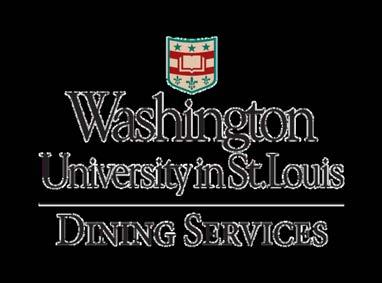Our Unique Nutrition & Athletics Program



Washington University in St. Louis






At Washington University in St. Louis, our position to educate student athletes is unique. Unlike many universities, our Division III athletics program does not have a dedicated sports nutrition department. Instead, our campus dietitians operate under Dining Services and work in close collaboration with our Habif Student Health & Wellness Center and Athletics. Our unique program allows a consistent message and cohesive nutrition approach to the entire campus community.
Historically, our nutrition team primarily only had the capacity to focus on one-on-one consultations, team talks, nutrition seminars for coaches and the athletic administration, as well as pre-season meal coordination. In discussion with our partners in Athletics regarding the needs of student athletes, we initially recognized the need for nutrition education and marketing within athletic spaces. In early 2022, we dedicated time within our nutrition team to focus on creating sport nutrition-specific education and marketing materials. Additionally, we were able to advocate support for an additional registered dietitian to be brought onto our team with the dedication of specific time each week for Athletics. With the growth of our team, we were able to expand our program and offerings with Athletics. Our program expansion includes additional pop-up and educational events, increased number and frequency of team talks, individual consultations, dedicated training room office hours, and increased attendance at team practices and events.
Our first marketing publication was our Key Nutrition Strategies for Performance posters. The poster topics included strategies for optimal daily performance, fueling pre, during, and post-workout, as well as daily and post-workout hydration. From there, we created the Key Nutrition Strategies for Athletes booklet for students to take this information and apply it to their daily routine. This booklet includes the information from the posters and additional tips for promoting a healthy relationship with food and their bodies. We educate our students that if their basic needs are not met, including adequate sleep and nutrition, their performance may ultimately suffer.
Using these strategies in conjunction with a gentle approach to nutrition greatly liberalizes what athletes feel they are allowed to eat, thereby fostering a culture of Health at Every Size. Reinforcing this positive relationship with food may also help with athletes who struggle with disordered eating patterns, alleviating some of the stigma around snacking, carbohydrates, weight, and "what athletes are supposed to look like."
Our goal is simple: to educate athletes how to adequately fuel their bodies while also encouraging a healthy mindset and relationship with food.
We meet our goal through four objectives:
Design and distribute effective educational and marketing materials to Athletics to promote our nutrition services on campus.

Implement nutrition education sessions through one-on-one consultations with student athletes, conducting team talks as well as nutrition-specific learning seminars with coaches and the Athletics Administration. Conduct pop-up events to provide nutrition education resources and fueling opportunities to student athletes. Collect data on our implementation efforts to determine effectiveness of information provided and areas for future opportunities.*
*Data collected to evaluate implementation efforts is incorporated throughout objectives 1-3 in this submission.
1. 2. 3. 4. Rebecca Miller, MPH, RDN, CSSD, LD Director for Nutrition & Dietary Wellness
Peyton Dixon, MS, RDN, LD Registered Dietitian
Claire Conroy, MS, RDN, LD Special Events Coordinator for Nutrition & Dietary Wellness
Rebecca Miller, MPH, RDN, CSSD, LD Director for Nutrition & Dietary Wellness
Peyton Dixon, MS, RDN, LD Registered Dietitian
Claire Conroy, MS, RDN, LD Special Events Coordinator for Nutrition & Dietary Wellness
Athletic Posters
Objective
Athletic Booklet

Nutrition Tip Handouts


These posters are featured in all dining locations as well as outside the Training Room in the Athletic Complex.

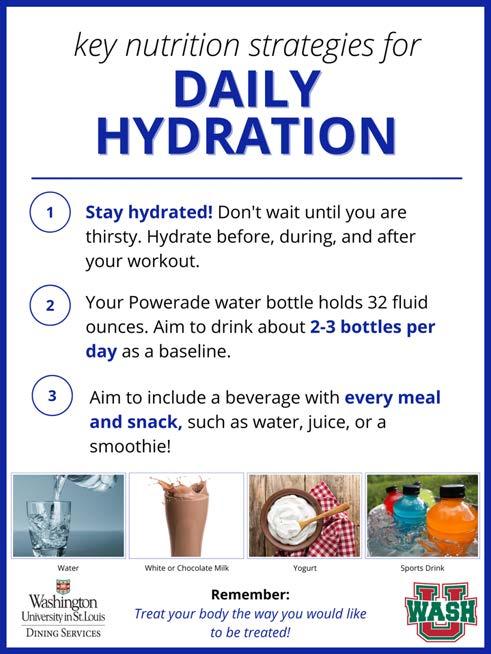




This small booklet was designed for student athletes as a daily reminder for their nutrition and overall wellness.
View the entire booklet in our uploaded supplemental materials.


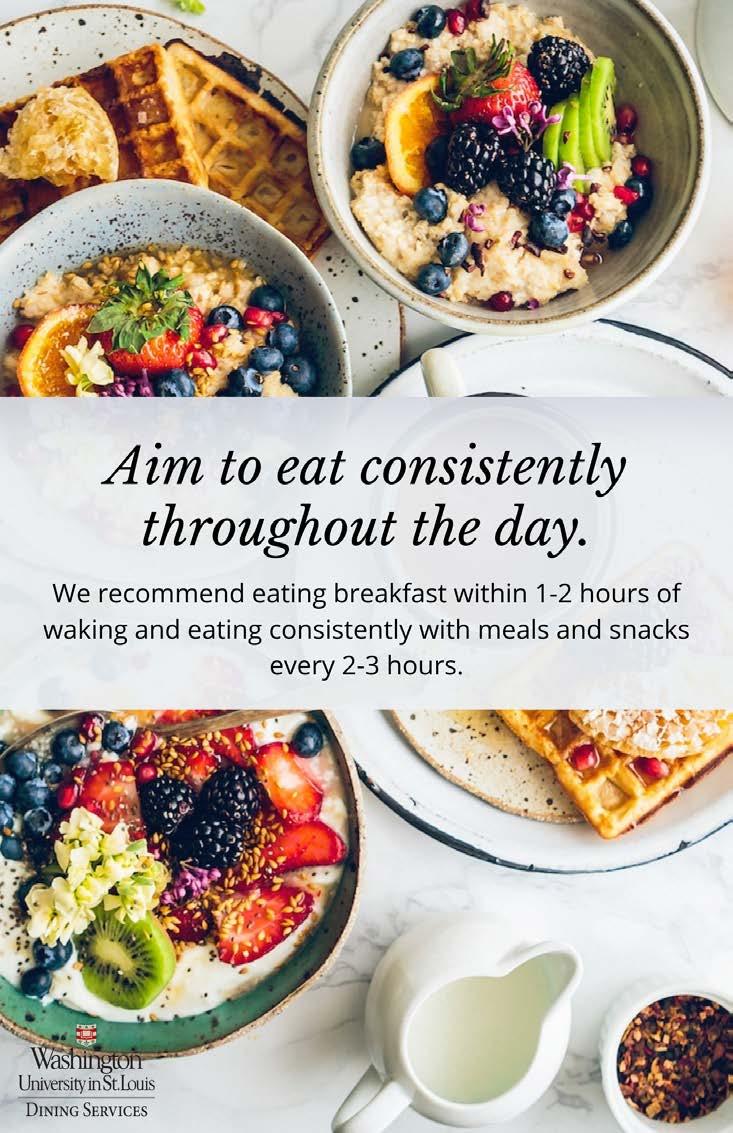
Our handouts have consistent messaging of gentle and flexible nutrition. These tips are relatable to what student athletes can access on campus in the dining locations.
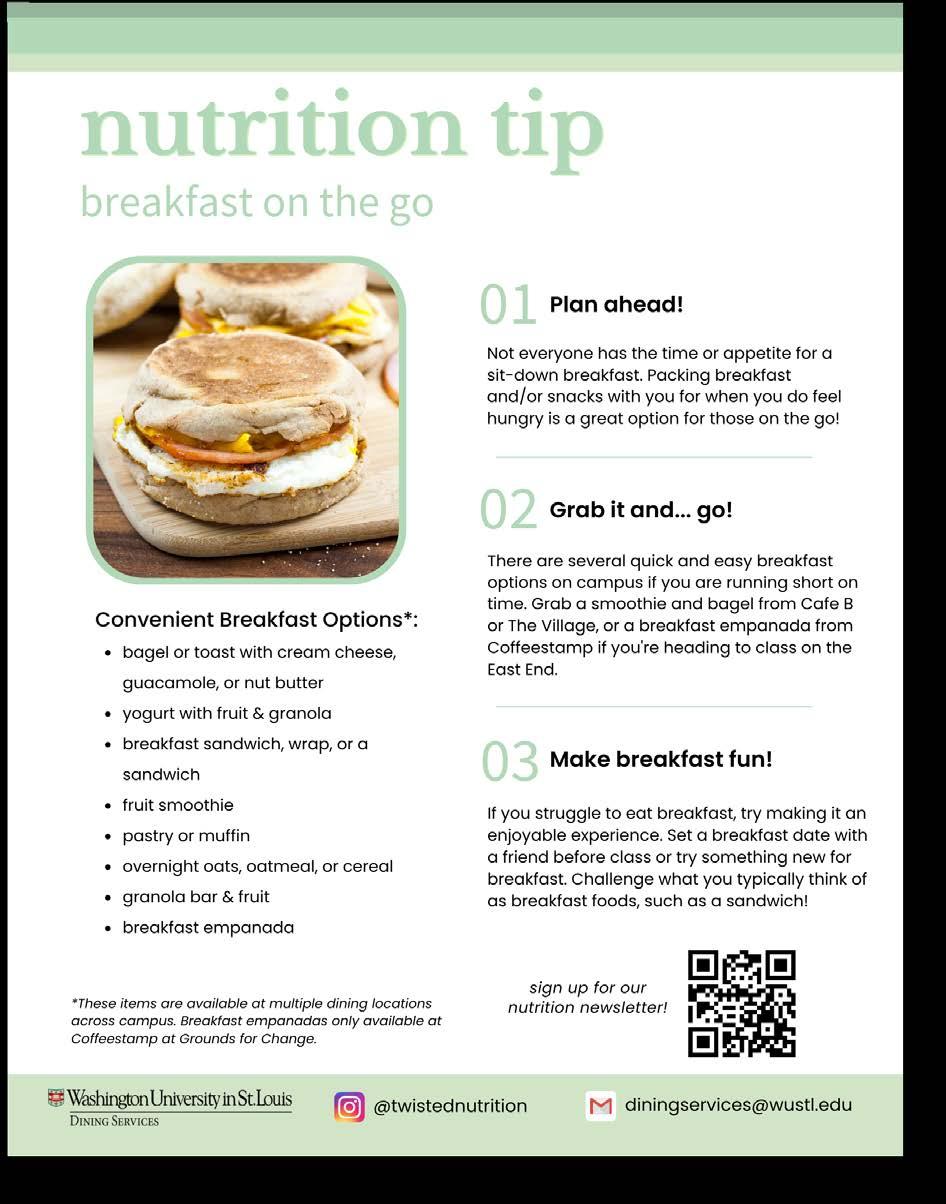
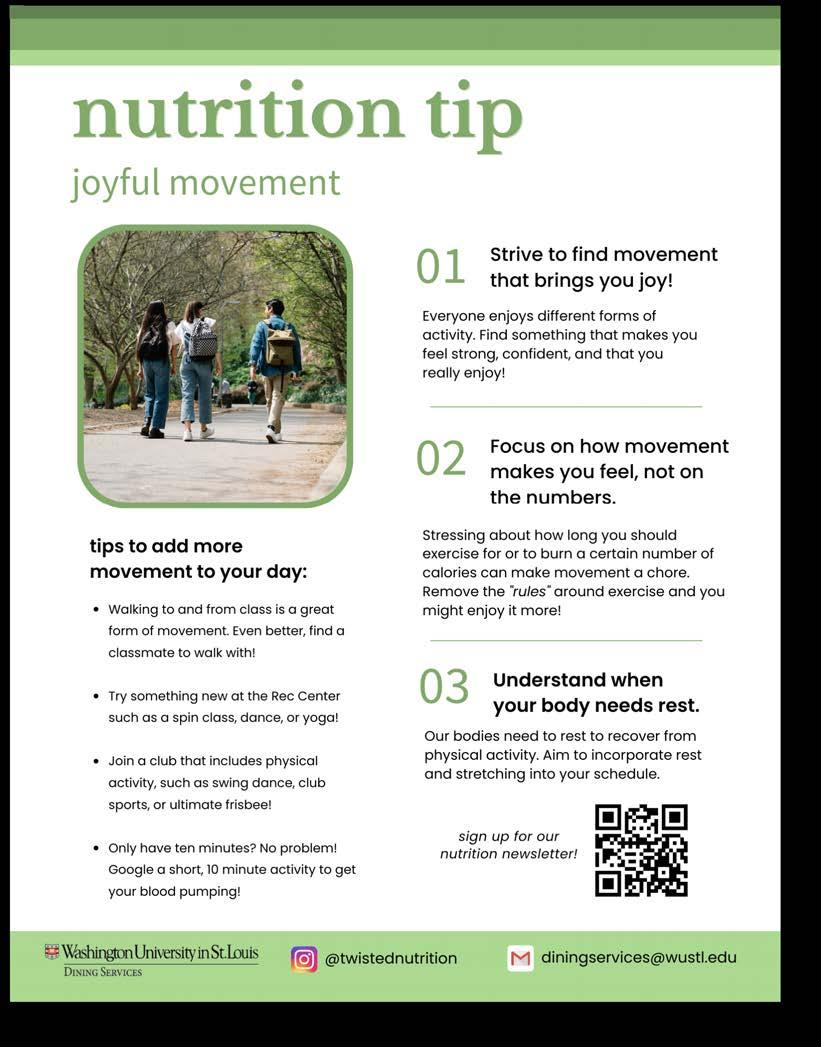
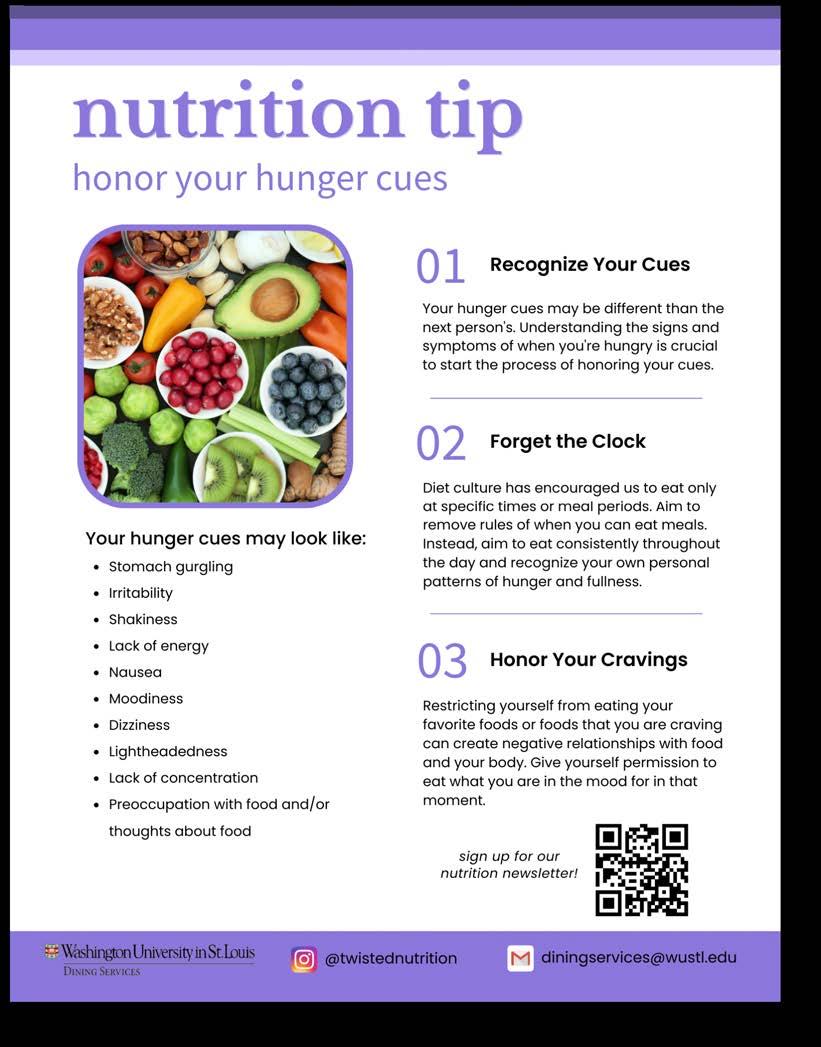
Two: Nutrition Education Opportunities
Team Talks
Training Room Office Hours
Seminars for Athletic Administration & Coaches
Student athletes are eligible for free, confidential nutrition consultations with our team. Our unique program allows us to create a well-rounded consultation for the student athlete, as well as a deep understanding of the dining options available on campus. Under Dining Services, our team can advocate for student needs by introducing new food items to campus and expanding menus. Private dining tours are also available to all students upon request.
This chart shows the breakdown of nutrition consults by type. About one-third of total student consults were for sports nutrition.

Team Talks are organized by coaches and our nutrition team. Team Talks are available all year round and are flexible to the teams' schedule. Through creative discussion and activities, Team Talks act as both a learning and bonding experience.
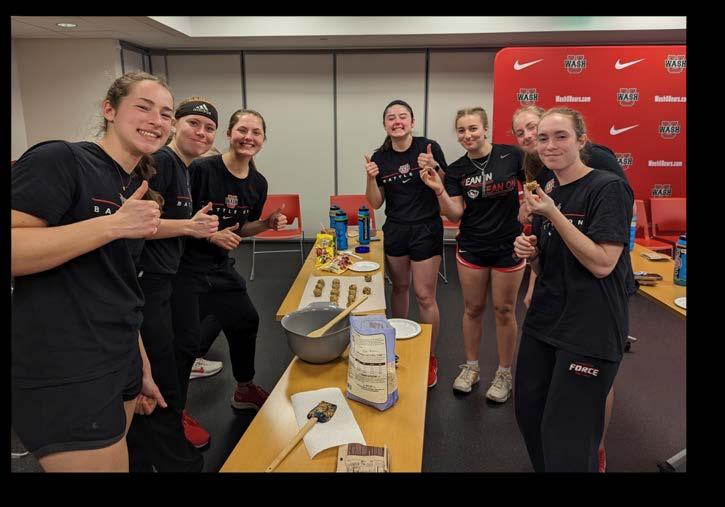
Previous Team Talk topics have included:

Key Nutrition Strategies for Athletes
Off-Season Nutrition for Baseball
How to Fuel as an Athlete featuring Sunflower Butter Energy Bites
Eat to Perform: In-Season Nutrition featuring the Sports Nutrition Pyramid
(student name) ,
(coach name)
From a survey administered over 8 Team Talks:
76% of student-athletes marked Nutrition Team Talks as "Extremely Important" (31%) or "Very Important" (45%).

Within our team talk, Key Nutrition Strategies for Athletes, students found the information about the most interesting (36%), followed by Pre-Exercise Nutrition (26%) and Post-Exercise Nutrition (21%).
When student-athletes were asked "Do you feel you will be able to implement the presented information into your day-to-day life?", 43% answered "Definitely Yes" and the remainder (57%) responded "Probably Yes."
Each week, our nutrition team conducts office hours in WashU's Training Room located in the Athletic Complex. Walk-in visits and scheduled appointments are welcome within office hours. In a six-month time frame, over 150 hours have been spent in the training room conducting office hours.
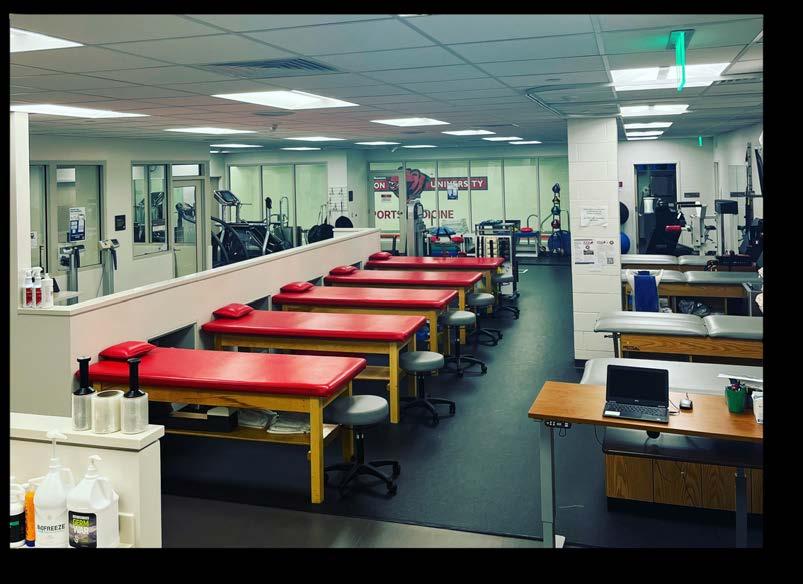
Interprofessional Collaboration during Office Hours
Athletic Trainers Coaches
Certified Strength and Conditioning Specialists
Athletic Department Administration
Sports Medicine Physicians
adequate hydration
benefitsofsnacking andpre-,during,nutritionexercisepostbuilding a healthy relationship with food promotinga foodfirstculturevs. supplementation mythbusting, prioritizing carbohydrates& overallenergy needs
We aim to ensure consistent messaging with our student athletes about adequate nutrition, proper hydration, and supplement use. To meet this goal, we coordinate seminars with stakeholders including coaches, strength and conditioning specialists, athletic trainers, and others in the Athletic Administration.

Screenshots taken from one of our Seminars for the Athletic Administration and Coaches. View the entire presentation in our supplemental materials.

(coach name)


Resources, like this snack list from Costco, are commonly provided to coaches from our Nutrition Team. Other resources may include dietitian-recommended restaurants or fast food to visit when traveling or snacks to purchase on a tight budget.



This graph demonstrates the total number of hours spent with each athletic team between August 2022- March 2023 including individual consult hours of students on that team, practice & game (P&G) visits, and all Team Talks. This graph does not include total office training hours or the Athletic Administration seminars; yet, 76% of sports nutrition consults have come from student-athletes utilizing, or being referred, during athletics office hours.

Pre-Season Menus
Three: Special Events for Athletes
Life Skills Class for First Year Athletes
Tasty Tuesdays at the Rec Center
National Nutrition Month Pop-Up Events
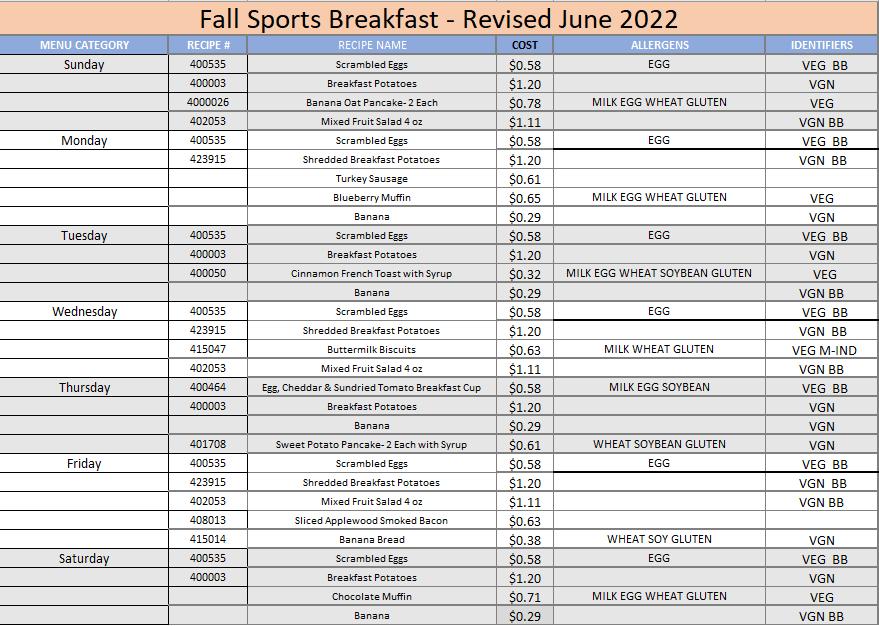




The feedback provided shows that 69% of student-athletes found preseason meals to be at least satisfactory. The most dissatisfying qualities of the pre-season meals were the variety and the nutrient density. More than simply showing that student-athletes want more nutrient dense foods for their pre-season meals, additionally, with support from other collected data, this response suggests an increased value of nutrition overall among student-athletes.

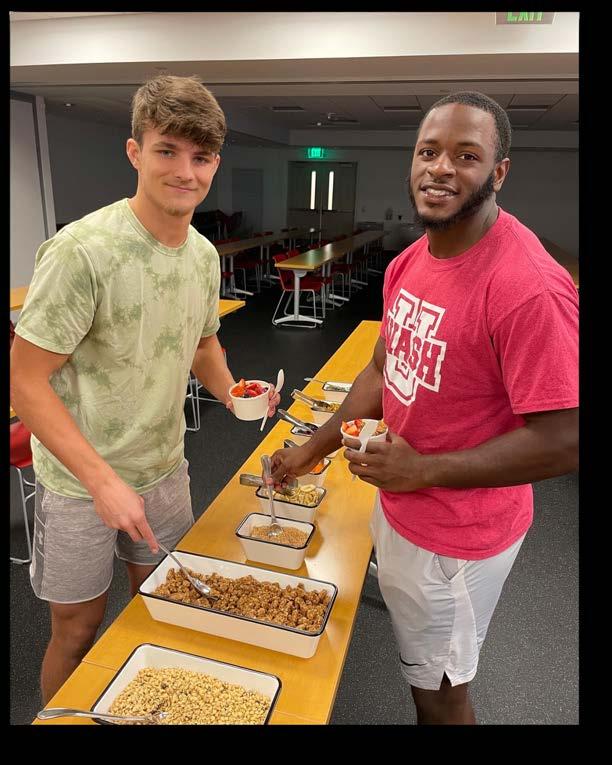
Life Skills, a newly implemented elective for first-year student athletes, was designed to teach varying skill sets to improve their overall well-being and university experience. Our nutrition lesson was "Key Nutrition Strategies For Athletes" and also included a Nutrition Family Feud! game. We also brought a catered build-your-own yogurt parfait station and burrito bar.
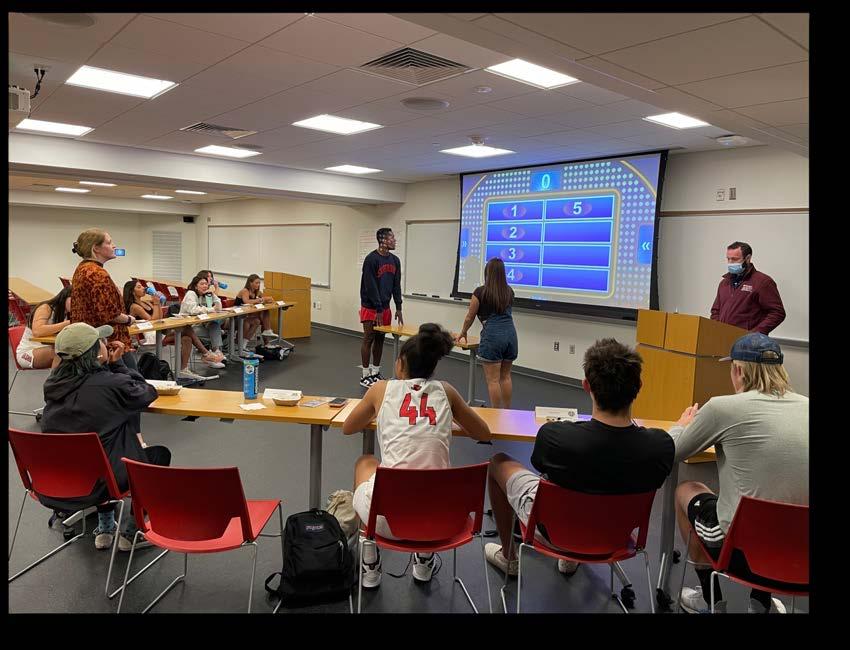
“With time, self-love, and more reassurance from people like (Claire and Peyton), I understand that the healthiest diet is one that works best with me and my body, not something from social media or a website. I also enjoyed the way the two actively engaged with the class through food and games. I thought that showing information on Monday & following up with a game on Wednesday to display the things that we learned was a good practice of retrieval while also getting competitive with my classmates. Overall, I enjoyed this week’s presentation since it provided a lot of delicious and healthy food options while engaging the class in a fun way.”
– First Year WashU Varsity Student-AthleteAfter each Life Skills topic, students were surveyed about their thoughts on the class. Out of 11 topics covered throughout the semester, Nutrition was ranked highest in both class sections!

Each Tuesday afternoon, our Nutrition team features a tabling event in the lobby of the Rec Center. The goal of this recurring event is to educate on a specific nutrition topic. We also aim to sample a food product related to the topic that students can purchase in our dining facilities.
Previous Tasty Tuesday Topics:
The Four R's for Recovery (Rest, Refuel, Rehydrate, and Repair)

Sampled four types of energy bars
Hydration & The Use of Electrolyte Rich Beverages

Sampled electrolyte-rich drinks including Powerade
Using Simple Carbohydrates for Quick Energy
Sampled fruit snacks and Rice Krispy treats
Vegetarian Protein Sources
Sampled vegan "beef" jerky
From a survey administered at each Tasty Tuesday event,
90% of students found the information presented at Tasty Tuesday events informative.

From the survey administered at each Tasty Tuesday event, students noted these topics as other areas they would like to learn about:
snacking
healthy snacks
carbohydrates
hydration
vegetarian proteins
protein intake
carbs
proper hydration
caffeine
post-workout
food
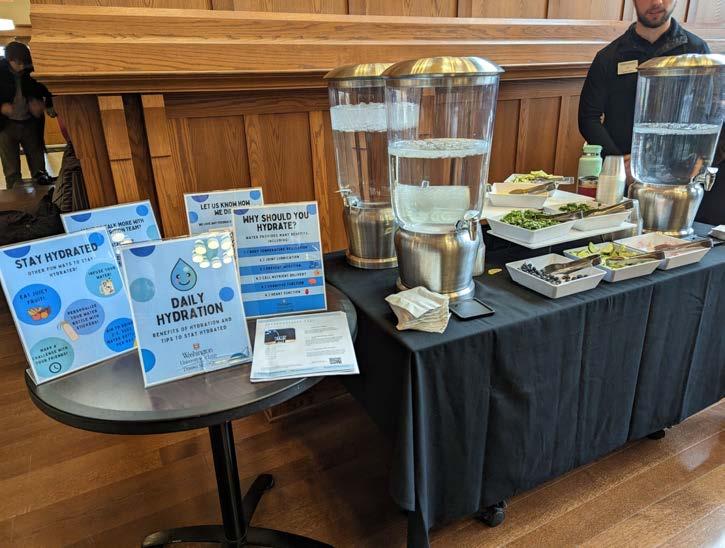


Cooking Classes for Athletics
Goals for the Future:
Grocery Store Tours for Athletics
Develop and Implement a Sports Performance Nutrition Series
Travel/Attend Away Competitions
Explore Opportunities for Hydration & Fueling Stations
